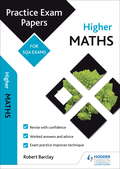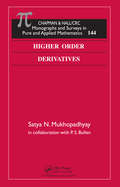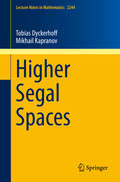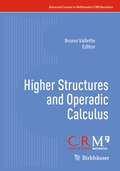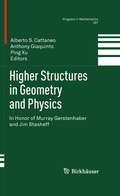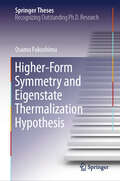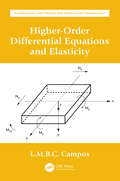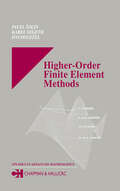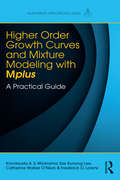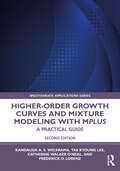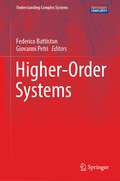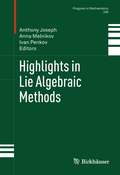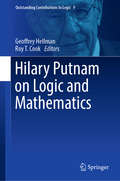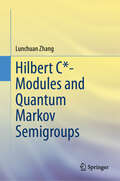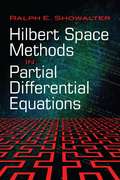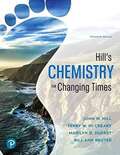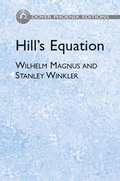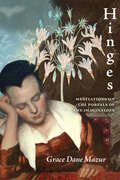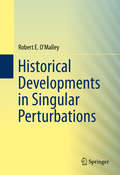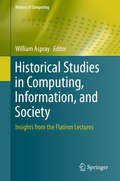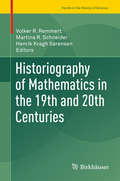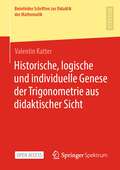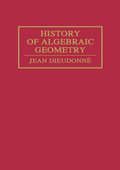- Table View
- List View
Higher Maths: Practice Papers for SQA Exams
by Bob BarclayPractise for your SQA exams with three specially-commissioned Hodder Gibson Practice Exam Papers.- Practise with model papers written and checked by experienced markers and examiners- Get extra advice with specially-written study-skills guidance sections- Gain vital extra marks and avoid common mistakes with examiner tips
Higher Order Derivatives (Monographs and Surveys in Pure and Applied Mathematics)
by Satya MukhopadhyayThe concept of higher order derivatives is useful in many branches of mathematics and its applications. As they are useful in many places, nth order derivatives are often defined directly. Higher Order Derivatives discusses these derivatives, their uses, and the relations among them. It covers higher order generalized derivatives, including the Pea
Higher Segal Spaces (Lecture Notes in Mathematics #2244)
by Tobias Dyckerhoff Mikhail KapranovThis monograph initiates a theory of new categorical structures that generalize the simplicial Segal property to higher dimensions. The authors introduce the notion of a d-Segal space, which is a simplicial space satisfying locality conditions related to triangulations of d-dimensional cyclic polytopes. Focus here is on the 2-dimensional case. Many important constructions are shown to exhibit the 2-Segal property, including Waldhausen’s S-construction, Hecke-Waldhausen constructions, and configuration spaces of flags. The relevance of 2-Segal spaces in the study of Hall and Hecke algebras is discussed.Higher Segal Spaces marks the beginning of a program to systematically study d-Segal spaces in all dimensions d. The elementary formulation of 2-Segal spaces in the opening chapters is accessible to readers with a basic background in homotopy theory. A chapter on Bousfield localizations provides a transition to the general theory, formulated in terms of combinatorial model categories, that features in the main part of the book. Numerous examples throughout assist readers entering this exciting field to move toward active research; established researchers in the area will appreciate this work as a reference.
Higher Structures and Operadic Calculus (Advanced Courses in Mathematics - CRM Barcelona)
by Bruno ValletteThis book presents the notes originating from five series of lectures given at the CRM Barcelona in 21-25 June, 2021, during the “Higher homotopical structures” programme. Since their introduction 60 years ago, the notions of infinity algebras (Stasheff, Sugawara), higher categories (Boardman-Vogt), operads (May), and model categories (Quillen) have given rise to powerful new tools which made possible the resolution of open problems and prompted revolutions in many domains like algebraic topology (rational homotopy theory, faithful algebraic invariants of the homotopy type of spaces), deformation theory (formality theorems, formal moduli problems), and mathematical physics (quantization of Poisson manifolds, quantum field theories), to name but a few. This theory of higher structures using operadic calculus is currently under rapid development. The aim of this book is to provide the community with an accessible state-of-the-art, while at the same time giving interested researchers and advanced students a brief overview on the subject.
Higher Structures in Geometry and Physics
by Ping Xu Anthony Giaquinto Alberto S. CattaneoThis book is centered around higher algebraic structures stemming from the work of Murray Gerstenhaber and Jim Stasheff that are now ubiquitous in various areas of mathematics-- such as algebra, algebraic topology, differential geometry, algebraic geometry, mathematical physics-- and in theoretical physics such as quantum field theory and string theory. These higher algebraic structures provide a common language essential in the study of deformation quantization, theory of algebroids and groupoids, symplectic field theory, and much more. Each contribution in this volume expands on the ideas of Gerstenhaber and Stasheff. The volume is intended for post-graduate students, mathematical and theoretical physicists, and mathematicians interested in higher structures.
Higher-Form Symmetry and Eigenstate Thermalization Hypothesis (Springer Theses)
by Osamu FukushimaThe eigenstate thermalization hypothesis (ETH) is a successful framework providing criteria for thermalization in isolated quantum systems. Although numerical and theoretical analyses support the ETH as a fundamental mechanism for explaining thermalization in diverse systems, it remains a challenge to analytically identify whether particular systems satisfy the ETH. In quantum many-body systems and quantum field theories, phenomena that violate the ETH are expected to imply nontrivial thermalization processes, and are gathering increasing attention. This book elucidates how the existence of higher-form symmetries influences the dynamics of thermalization in isolated quantum systems. Under reasonable assumptions, it is analytically shown that a p-form symmetry in a (d+1)-dimensional quantum field theory leads to the breakdown of the ETH for many nontrivial (d−p)-dimensional observables. In the case of discrete higher-form (i.e., p ≥ 1) symmetry, this indicates the absence of thermalization for observables that are non-local but much smaller than the entire system size even though the system do have no local conserved quantities. The author provides numerical evidence for this argument for the (2+1)-dimensional Z2 lattice gauge theory. While local observables such as a plaquette operator thermalize even for mixed symmetry sectors, the non-local observable such as the one exciting a magnetic dipole instead relaxes to the generalized Gibbs ensemble that takes account of the Z2 1-form symmetry. The assumptions of the ETH-violation include the mixing of symmetry sectors within a given energy shell. This condition is rather challenging to verify because it requires information on the eigenstates in the middle of the spectrum. In the subsequent chapter, we further reconsider this assumption from the viewpoint of a projective phase to alleviate this difficulty. In the case of ZN symmetries, the difficulty can be circumvented considering ZN×ZN-symmetric theories with a projective phase, and then perturbing the Hamiltonian while preserving one of the ZN symmetries of interest. Additionally, the book also presents numerical analyses for (1+1)-dimensional spin chains and the (2+1)-dimensional Z2 lattice gauge theory to demonstrate this scenario.
Higher-Order Differential Equations and Elasticity (Mathematics and Physics for Science and Technology)
by Luis Manuel Braga da Costa CamposHigher-Order Differential Equations and Elasticity is the third book within Ordinary Differential Equations with Applications to Trajectories and Vibrations, Six-volume Set. As a set, they are the fourth volume in the series Mathematics and Physics Applied to Science and Technology. This third book consists of two chapters (chapters 5 and 6 of the set). The first chapter in this book concerns non-linear differential equations of the second and higher orders. It also considers special differential equations with solutions like envelopes not included in the general integral. The methods presented include special differential equations, whose solutions include the general integral and special integrals not included in the general integral for myriad constants of integration. The methods presented include dual variables and differentials, related by Legendre transforms, that have application in thermodynamics. The second chapter concerns deformations of one (two) dimensional elastic bodies that are specified by differential equations of: (i) the second-order for non-stiff bodies like elastic strings (membranes); (ii) fourth-order for stiff bodies like bars and beams (plates). The differential equations are linear for small deformations and gradients and non-linear otherwise. The deformations for beams include bending by transverse loads and buckling by axial loads. Buckling and bending couple non-linearly for plates. The deformations depend on material properties, for example isotropic or anisotropic elastic plates, with intermediate cases such as orthotropic or pseudo-isotropic. Discusses differential equations having special integrals not contained in the general integral, like the envelope of a family of integral curves Presents differential equations of the second and higher order, including non-linear and with variable coefficients Compares relation of differentials with the principles of thermodynamics Describes deformations of non-stiff elastic bodies like strings and membranes and buckling of stiff elastic bodies like bars, beams, and plates Presents linear and non-linear waves in elastic strings, membranes, bars, beams, and plates
Higher-Order Finite Element Methods (Studies in Advanced Mathematics)
by Pavel Solin Karel Segeth Ivo DolezelThe finite element method has always been a mainstay for solving engineering problems numerically. The most recent developments in the field clearly indicate that its future lies in higher-order methods, particularly in higher-order hp-adaptive schemes. These techniques respond well to the increasing complexity of engineering simulations and
Higher-Order Growth Curves and Mixture Modeling with Mplus: A Practical Guide (Multivariate Applications Series)
by Kandauda K.A.S. Wickrama Tae Kyoung Lee Catherine Walker O’Neal Frederick O. LorenzThis practical introduction to second-order and growth mixture models using Mplus introduces simple and complex techniques through incremental steps. The authors extend latent growth curves to second-order growth curve and mixture models and then combine the two. To maximize understanding, each model is presented with basic structural equations, figures with associated syntax that highlight what the statistics mean, Mplus applications, and an interpretation of results. Examples from a variety of disciplines demonstrate the use of the models and exercises allow readers to test their understanding of the techniques. A comprehensive introduction to confirmatory factor analysis, latent growth curve modeling, and growth mixture modeling is provided so the book can be used by readers of various skill levels. The book’s datasets are available on the web. Highlights include: -Illustrative examples using Mplus 7.4 include conceptual figures, Mplus program syntax, and an interpretation of results to show readers how to carry out the analyses with actual data. -Exercises with an answer key allow readers to practice the skills they learn. -Applications to a variety of disciplines appeal to those in the behavioral, social, political, educational, occupational, business, and health sciences. -Data files for all the illustrative examples and exercises at www.routledge.com/9781138925151 allow readers to test their understanding of the concepts. -Point to Remember boxes aid in reader comprehension or provide in-depth discussions of key statistical or theoretical concepts. Part 1 introduces basic structural equation modeling (SEM) as well as first- and second-order growth curve modeling. The book opens with the basic concepts from SEM, possible extensions of conventional growth curve models, and the data and measures used throughout the book. The subsequent chapters in part 1 explain the extensions. Chapter 2 introduces conventional modeling of multidimensional panel data, including confirmatory factor analysis (CFA) and growth curve modeling, and its limitations. The logical and theoretical extension of a CFA to a second-order growth curve, known as curve-of-factors model (CFM), are explained in Chapter 3. Chapter 4 illustrates the estimation and interpretation of unconditional and conditional CFMs. Chapter 5 presents the logical and theoretical extension of a parallel process model to a second-order growth curve, known as factor-of-curves model (FCM). Chapter 6 illustrates the estimation and interpretation of unconditional and conditional FCMs. Part 2 reviews growth mixture modeling including unconditional growth mixture modeling (Ch. 7) and conditional growth mixture models (Ch. 8). How to extend second-order growth curves (curve-of-factors and factor-of-curves models) to growth mixture models is highlighted in Chapter 9. Ideal as a supplement for use in graduate courses on (advanced) structural equation, multilevel, longitudinal, or latent variable modeling, latent growth curve and mixture modeling, factor analysis, multivariate statistics, or advanced quantitative techniques (methods) taught in psychology, human development and family studies, business, education, health, and social sciences, this book’s practical approach also appeals to researchers. Prerequisites include a basic knowledge of intermediate statistics and structural equation modeling.
Higher-Order Growth Curves and Mixture Modeling with Mplus: A Practical Guide (Multivariate Applications Series)
by Tae Kyoung Lee Catherine Walker O’Neal Frederick O. Lorenz Kandauda A.S. WickramaThis practical introduction to second-order and growth mixture models using Mplus introduces simple and complex techniques through incremental steps. The authors extend latent growth curves to second-order growth curve and mixture models and then combine the two using normal and non-normal (e.g., categorical) data. To maximize understanding, each model is presented with basic structural equations, figures with associated syntax that highlight what the statistics mean, Mplus applications, and an interpretation of results. Examples from a variety of disciplines demonstrate the use of the models and exercises allow readers to test their understanding of the techniques. A comprehensive introduction to confirmatory factor analysis, latent growth curve modeling, and growth mixture modeling is provided so the book can be used by readers of various skill levels. The book’s datasets are available on the web. New to this edition: * Two new chapters providing a stepwise introduction and practical guide to the application of second-order growth curves and mixture models with categorical outcomes using the Mplus program. Complete with exercises, answer keys, and downloadable data files. * Updated illustrative examples using Mplus 8.0 include conceptual figures, Mplus program syntax, and an interpretation of results to show readers how to carry out the analyses with actual data. This text is ideal for use in graduate courses or workshops on advanced structural equation, multilevel, longitudinal or latent variable modeling, latent growth curve and mixture modeling, factor analysis, multivariate statistics, or advanced quantitative techniques (methods) across the social and behavioral sciences.
Higher-Order Systems (Understanding Complex Systems)
by Federico Battiston Giovanni PetriThe book discusses the potential of higher-order interactions to model real-world relational systems. Over the last decade, networks have emerged as the paradigmatic framework to model complex systems. Yet, as simple collections of nodes and links, they are intrinsically limited to pairwise interactions, limiting our ability to describe, understand, and predict complex phenomena which arise from higher-order interactions. Here we introduce the new modeling framework of higher-order systems, where hypergraphs and simplicial complexes are used to describe complex patterns of interactions among any number of agents. This book is intended both as a first introduction and an overview of the state of the art of this rapidly emerging field, serving as a reference for network scientists interested in better modeling the interconnected world we live in.
Highlights in Lie Algebraic Methods
by Anna Melnikov Ivan Penkov Anthony JosephThis volume consists of expository and research articles that highlight the various Lie algebraic methods used in mathematical research today. Key topics discussed include spherical varieties, Littelmann Paths and Kac-Moody Lie algebras, modular representations, primitive ideals, representation theory of Artin algebras and quivers, Kac-Moody superalgebras, categories of Harish-Chandra modules, cohomological methods, and cluster algebras.
Hilary Putnam on Logic and Mathematics (Outstanding Contributions to Logic #9)
by Roy T. Cook Geoffrey HellmanThis book explores the research of Professor Hilary Putnam, a Harvard professor as well as a leading philosopher, mathematician and computer scientist. It features the work of distinguished scholars in the field as well as a selection of young academics who have studied topics closely connected to Putnam’s work. It includes 12 papers that analyze, develop, and constructively criticize this notable professor's research in mathematical logic, the philosophy of logic and the philosophy of mathematics. In addition, it features a short essay presenting reminiscences and anecdotes about Putnam from his friends and colleagues, and also includes an extensive bibliography of his work in mathematics and logic. The book offers readers a comprehensive review of outstanding contributions in logic and mathematics as well as an engaging dialogue between prominent scholars and researchers. It provides those interested in mathematical logic, the philosophy of logic, and the philosophy of mathematics unique insights into the work of Hilary Putnam.
Hilbert C*- Modules and Quantum Markov Semigroups
by Lunchuan ZhangThis book explains the basic theory of Hilbert C*-module in detail, covering a wide range of applications from generalized index to module framework. At the center of the book, the Beurling-Deny criterion is characterized between operator valued Dirichlet forms and quantum Markov semigroups, hence opening a new field of quantum probability research. The general scope of the book includes: basic theory of Hilbert C*-modules; generalized indices and module frames; operator valued Dirichlet forms; and quantum Markov semigroups.This book will be of value to scholars and graduate students in the fields of operator algebra, quantum probability and quantum information.
Hilbert Space Methods in Partial Differential Equations (Dover Books on Mathematics)
by Ralph E. ShowalterThis text surveys the principal methods of solving partial differential equations. Suitable for graduate students of mathematics, engineering, and physical sciences, it requires knowledge of advanced calculus.The initial chapter contains an elementary presentation of Hilbert space theory that provides sufficient background for understanding the rest of the book. Succeeding chapters introduce distributions and Sobolev spaces and examine boundary value problems, first- and second-order evolution equations, implicit evolution equations, and topics related to optimization and approximation. The text, which features 40 examples and 200 exercises, concludes with suggested readings and a bibliography.
Hilbert Space Methods in Signal Processing
by Rodney A. Kennedy Parastoo SadeghiThis lively and accessible book describes the theory and applications of Hilbert spaces and also presents the history of the subject to reveal the ideas behind theorems and the human struggle that led to them. The authors begin by establishing the concept of 'countably infinite', which is central to the proper understanding of separable Hilbert spaces. Fundamental ideas such as convergence, completeness and dense sets are first demonstrated through simple familiar examples and then formalised. Having addressed fundamental topics in Hilbert spaces, the authors then go on to cover the theory of bounded, compact and integral operators at an advanced but accessible level. Finally, the theory is put into action, considering signal processing on the unit sphere, as well as reproducing kernel Hilbert spaces. The text is interspersed with historical comments about central figures in the development of the theory, which helps bring the subject to life.
Hill's Chemistry for Changing Times
by John Hill Terry McCreary Marilyn Duerst Rill ReuterEngage students with contemporary and relevant applications of chemistry. <p><p> Chemistry for Changing Timeshas defined the liberal arts course and remains the most visually appealing and readable introduction for the subject. Abundant applications and examples fill each chapter and enable students of varied majors to readily relate to chemistry. <p><p> For the 15th Edition, author Terry McCreary and new coauthors Marilyn Duerst and Rill Ann Reuter, introduce new examples and a consistent model for problem solving. They guide students through the problem-solving process, asking them to apply the models and combine them with previously learned concepts. <p><p>New problem types engage and challenge students to develop skills they will use in their everyday lives, including developing scientific literacy, analyzing graphs and data, recognizing fake vs. real news, and creating reports. New relevant, up-to-date applications focus on health and wellness and the environment, helping non-science and allied-health majors taking the course to see the connections between the course materials and their everyday lives.
Hill's Equation
by Wilhelm Magnus Stanley WinklerThe hundreds of applications of Hill's equation in engineering and physics range from mechanics and astronomy to electric circuits, electric conductivity of metals, and the theory of the cyclotron. New applications are continually being discovered and theoretical advances made since Liapounoff established the equation's fundamental importance for stability problems in 1907. Brief but thorough, this volume offers engineers and mathematicians a complete orientation to the subject."Hill's equation" connotes the class of homogeneous, linear, second order differential equations with real, periodic coefficients. This two part treatment encompasses the most pertinent, necessary information; only the theory's elementary facts are proved in full, with minimal use of sophisticated mathematics. Part I explains the basic theory: Floquet's theorem, characteristic values and intervals of stability, analytic properties of the discriminant, infinite determinants, asymptotic behavior of the characteristic values, theorems of Liapounoff and Borg, and related topics. Part II examines numerous details: elementary formulas, oscillatory solutions, intervals of stability and instability, discriminant, coexistence, and examples. Particular attention is given to stability problems and to the question of coexistence of periodic solutions.Although intended for professional mathematicians and engineers, the volume is written so clearly and vigorously that it can be recommended for graduate students and advanced undergraduates. List of Symbols and Notations. List of Theorems, Lemmas, and Corollaries. References. Index.
Hinges: Meditations on the Portals of the Imagination
by Grace MazurGrace Dane Mazur uses the idea of the hinge to illuminate real and metaphysical thresholds in fiction, poetry, myth, and ordinary life. From ancient narratives of Gilgamesh, Odysseus, Parmenides, and Orpheus, to modern works by Katherine Mansfield and Eudora Welty, the exploration of the Other World acts as a metaphor for the entrancement of readin
Hip Prosthesis: CAD Modeling, Finite Element Analysis (FEA) and Compressive Load Testing (SpringerBriefs in Applied Sciences and Technology)
by Solehuddin Shuib Najwa Syakirah Hamizan Amir Radzi Ab GhaniThis book highlights the critical challenge of improving the design and performance of hip implants, which are essential for enhancing patient outcomes in hip replacement surgeries. The book focuses on utilizing Finite Element Analysis (FEA) to optimize implant designs, ensuring they can withstand complex mechanical loads and reduce the risk of failure. It is hoped that readers will gain a deeper understanding of the significance of implant design and the role of FEA in predicting and enhancing implant performance, ultimately leading to better, more durable solutions in orthopedic surgeries.
Historical Developments in Singular Perturbations
by Robert E. O'MalleyThis engaging text describes the development of singular perturbations, including its history, accumulating literature, and its current status. While the approach of the text is sophisticated, the literature is accessible to a broad audience. A particularly valuable bonus are the historical remarks. These remarks are found throughout the manuscript. They demonstrate the growth of mathematical thinking on this topic by engineers and mathematicians. The book focuses on detailing how the various methods are to be applied. These are illustrated by a number and variety of examples. Readers are expected to have a working knowledge of elementary ordinary differential equations, including some familiarity with power series techniques, and of some advanced calculus. Dr. O'Malley has written a number of books on singular perturbations. This book has developed from many of his works in the field of perturbation theory.
Historical Studies in Computing, Information, and Society: Insights from the Flatiron Lectures (History of Computing)
by William AsprayThis is a volume of chapters on the historical study of information, computing, and society written by seven of the most senior, distinguished members of the History of Computing field. These are edited, expanded versions of papers presented in a distinguished lecture series in 2018 at the University of Colorado Boulder – in the shadow of the Flatirons, the front range of the Rocky Mountains. Topics range widely across the history of computing. They include the digitalization of computer and communication technologies, gender history of computing, the history of data science, incentives for innovation in the computing field, labor history of computing, and the process of standardization. Authors were given wide latitude to write on a topic of their own choice, so long as the result is an exemplary article that represents the highest level of scholarship in the field, producing articles that scholars in the field will still look to read twenty years from now. The intention is to publish articles of general interest, well situated in the research literature, well grounded in source material, and well-polished pieces of writing. The volume is primarily of interest to historians of computing, but individual articles will be of interest to scholars in media studies, communication, computer science, cognitive science, general and technology history, and business.
Historiography of Mathematics in the 19th and 20th Centuries
by Volker R. Remmert Martina R. Schneider Henrik Kragh SørensenThis book addresses the historiography of mathematics as it was practiced during the 19th and 20th centuries by paying special attention to the cultural contexts in which the history of mathematics was written. In the 19th century, the history of mathematics was recorded by a diverse range of people trained in various fields and driven by different motivations and aims. These backgrounds often shaped not only their writing on the history of mathematics, but, in some instances, were also influential in their subsequent reception. During the period from roughly 1880-1940, mathematics modernized in important ways, with regard to its content, its conditions for cultivation, and its identity; and the writing of the history of mathematics played into the last part in particular. Parallel to the modernization of mathematics, the history of mathematics gradually evolved into a field of research with its own journals, societies and academic positions. Reflecting both a new professional identity and changes in its primary audience, various shifts of perspective in the way the history of mathematics was and is written can still be observed to this day. Initially concentrating on major internal, universal developments in certain sub-disciplines of mathematics, the field gradually gravitated towards a focus on contexts of knowledge production involving individuals, local practices, problems, communities, and networks. The goal of this book is to link these disciplinary and methodological changes in the history of mathematics to the broader cultural contexts of its practitioners, namely the historians of mathematics during the period in question.
Historische, logische und individuelle Genese der Trigonometrie aus didaktischer Sicht (Bielefelder Schriften zur Didaktik der Mathematik #10)
by Valentin KatterIn diesem Open-Access-Buch führt Valentin Katter eine umfassende didaktisch orientierte Sachanalyse unter historisch-, logisch-, und individualgenetischen Gesichtspunkten durch, mit der es ihm möglich ist, systematisch sechs Grundvorstellungen zum Sinusbegriff zu identifizieren. Anhand detaillierter Videoanalysen zeigt der Autor anschließend, wie diese Grundvorstellungen genutzt werden können, um Denkprozesse von Lehramtsstudierenden in kooperativen Problemlösesituationen zu rekonstruieren. Diese Rekonstruktionen gewähren einen Einblick in das komplexe individuelle Netz von Vorstellungen und ermöglichen es, das Potential und mögliche Hindernisse, die in ihm stecken, auszuloten.
History Algebraic Geometry
by Suzanne C. DieudonneThis book contains several fundamental ideas that are revived time after time in different guises, providing a better understanding of algebraic geometric phenomena. It shows how the field is enriched with loans from analysis and topology and from commutative algebra and homological algebra.
